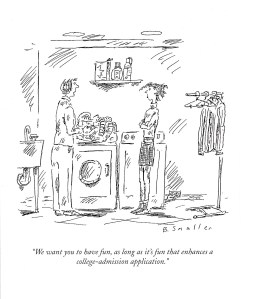I’m sure you’ve been preparing diligently for the ACT. Don’t forget these last minute suggestions:
The reading questions do NOT go in line number order.
The best technique for most people is to start by reading the small publication information at the top to get a sense of what the essay will be about and who the audience is. Then read a paragraph or two. If you understand it well and it’s not too detailed, read it all and then answer the questions. If you’re completely lost, abandon that passage and move on. You can come back to it after you’ve completed the passages that seem more understandable. Once you return to that passage, if you find you’re losing focus or are confused or just bored, stop after one or two paragraphs and search for questions you can answer based on the lines you have read. Then go back, read another paragraph or two, and stop to search for more questions you can answer. That strategy will help keep you focused — and prevent you from having to reread an entire passage if there’s something you don’t understand.
For the grammar section, remember these general guidelines (not hard-and-fast rules but handy guidelines);
- They prefer shorter sentences rather than longer sentences.
- They prefer fewer commas rather than more commas.
- The words “being” and “having” are almost never correct. Avoid any answer with these words unless the remaining choices are just awful.
Don’t spend too much time on any one math question. If you get a question you can’t answer easily, circle the question number (so you can go back later), bubble in your favorite letter, and move on.
Here are a few more things you can do:
1. The night before the test, get a good night’s sleep. Don’t try to go to bed too early or you’ll be up half the night staring at the ceiling. Just get a good amount of sleep after a restful evening. NO STUDYING TODAY! Not even for the ACTs.
2. Saturday morning of the test, dress up a little. When you’re wearing comfy, floppy clothes, your brain takes a rest, too. When you dress up a little (whatever that means to you), you sit a little straighter and concentrate better. Insider tip: several studies suggest that kids do worse on standardized tests if they see or wear the color red because they associate red with failure. So, keep away from red.
3. Have breakfast. Even if you don’t usually have breakfast, have breakfast the morning of the ACTs. Make sure it’s mostly protein, not mostly carbohydrates like a bagel or muffin. Carbs give you a quick burst but leave you feeling sleepy when they wear off. Remember that the ACTs are about four hours long!
4. Get to the test site a bit early. I’d recommend arriving between 7:30 and 7:45, especially if you are not testing at your own high school. Get there early so you can settle in calmly.
5. Choose your seat. If they let you pick your seat, choose one away from distractors like the door or windows. Some kids do better if they’re not near friends; others do better if they sit near friends. Sit where you can concentrate. You can socialize afterwards.
6. Leave your cell phone home! If they catch you using it, even to check the time, they’ll take your test away from you and send you home. It’s been done in local high schools before. If you must bring it, turn it off. Turn it ALL THE WAY off, not on vibrate.
7. Bring the following:
- photo ID — driver’s license or permit or school photo ID.
- admit ticket — print out another from act.org if you lost it.
- pencils – bring at least three or four #2 pencils with clean erasers.
- calculator — change the batteries this week and make sure it works. Yes, a graphing calculator is fine.
- watch — many schools don’t have working wall clocks. Even if the room you’re in has a working clock, it may be behind you or hard to see. Don’t rely on the proctor to keep track of how much time you have left. If you don’t want to wear a watch, put it on the desk in front of you. Remember, you can’t use your phone to tell the time. Smart watches are not allowed, and some places don’t even allow digital watches of any kind, so borrow or buy a cheap watch with a dial face and hands.
- snacks — the most important thing you can bring! Bring lots of little chewy things (like tootsie rolls) that you can pop in your mouth easily. Also bring a more substantial snack for the 10-minute break in the middle. A power bar or granola bar works nicely.
- drink — tea helps you concentrate. The caffeine helps quite a bit, too. Bring iced tea or hot tea with sugar, not diet. If you hate iced tea, bring soda with caffeine and sugar. Gatorade has too much sodium, which ironically can make you more thirsty later.
Word of warning, especially for girls: During the long break, if you need the restroom, go there BEFORE you eat your granola bar or drink your iced tea. If you are delayed by a long bathroom line, they will start without you. (This did happen to a few kids I know!)
The ACT is a stamina test. The most important thing you can do is get some rest the day or two before. Know that no matter how smart the other kids in the room may be, if you’ve been working with me, you’re as prepared as anyone there and you’ll do just fine. Don’t forget to let me know your scores when they come back!
Wendy Segal







